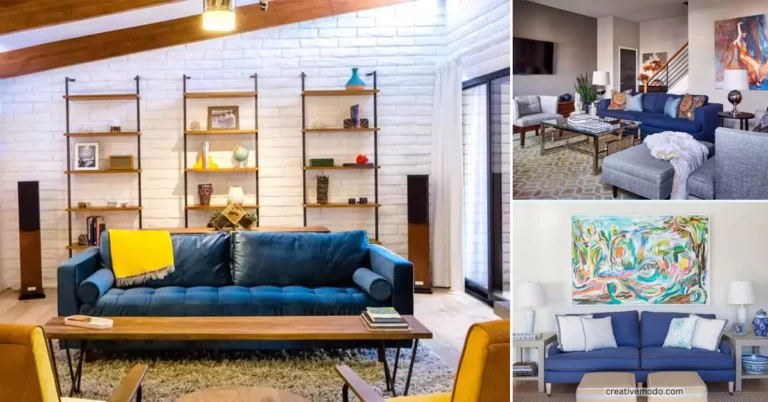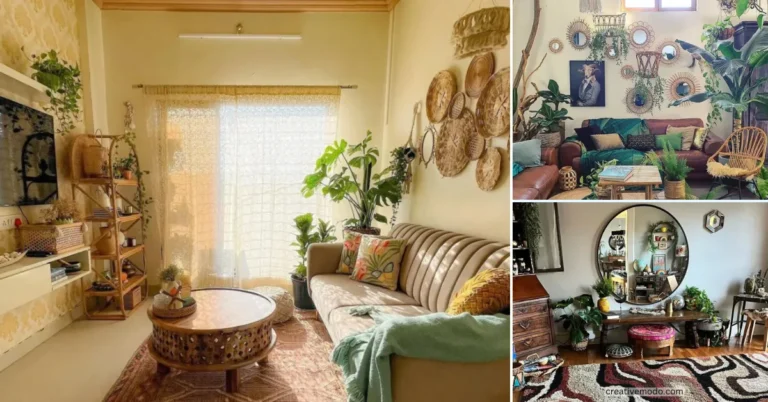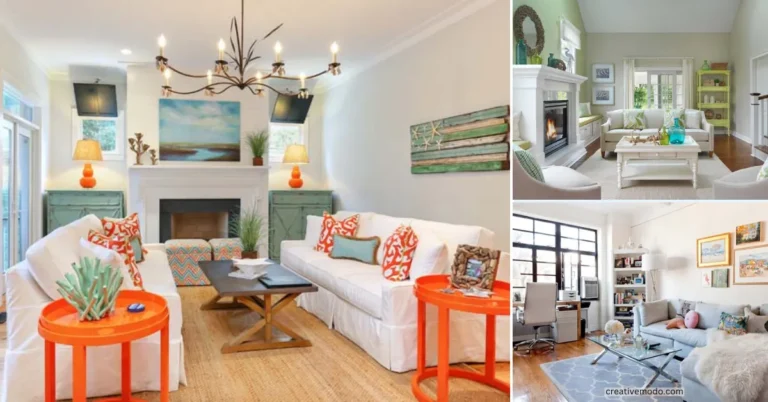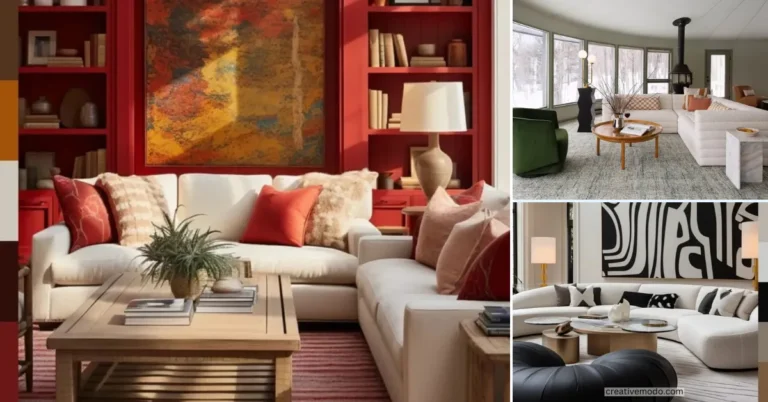20 Small Living Room Ideas With Tv
Designing a small living room with a TV requires a perfect balance between style, functionality, and comfort. Limited space doesn’t mean compromising on aesthetics—it’s an opportunity to get creative with layout, furniture choices, and decor elements. Whether you want the TV to be the focal point or blend seamlessly into the background, smart placement and clever design tricks can transform even the coziest spaces into stylish entertainment hubs.
The key to maximizing space is strategic planning. A well-thought-out seating arrangement, multi-functional furniture, and smart storage solutions can prevent clutter while enhancing the visual appeal of your living room. From wall-mounted TVs and floating shelves to symmetrical designs and hidden storage, every design choice plays a role in making a small space feel larger, airier, and more inviting.
But functionality doesn’t have to come at the cost of style. With the right color schemes, lighting techniques, and decor choices, you can create a cohesive, modern, or even rustic look that complements your lifestyle. Whether you’re working with a studio apartment or a compact family space, this guide explores 20 creative and practical ideas to help you design a small living room with a TV—without sacrificing elegance or comfort.
1. Decorate with Some Paintings on the Opposite Wall
Creating a balanced and visually appealing small living room requires careful attention to symmetry. Placing paintings on the opposite wall of your TV can help achieve this balance by drawing the eye across the room, preventing the television from dominating the space. The artwork acts as a counterpoint, allowing the living area to feel more thoughtfully designed rather than centered solely around the screen.
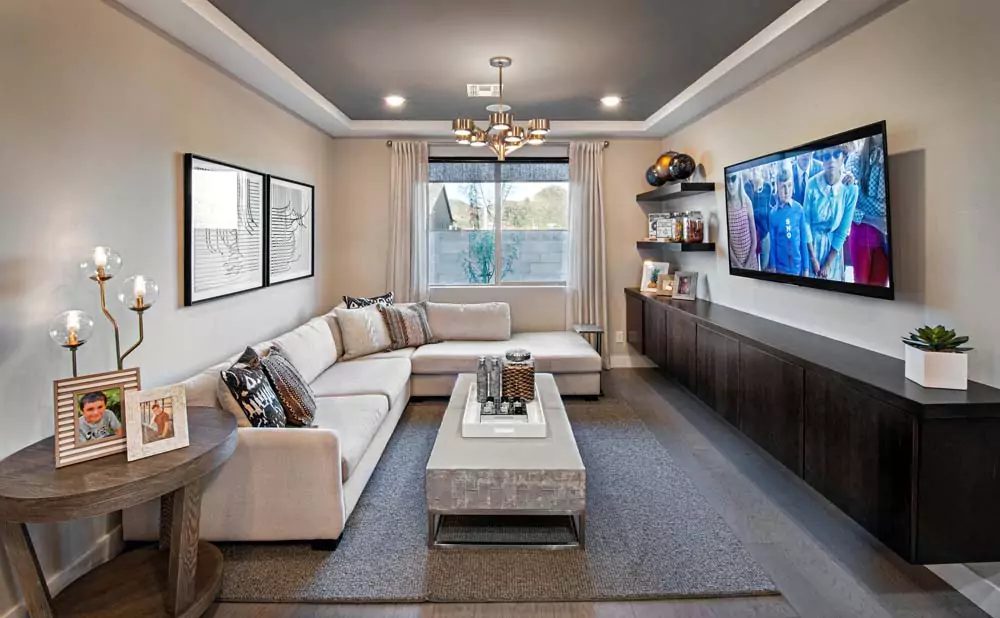
Beyond aesthetics, this approach introduces personality and warmth to the room. Choosing bold, vibrant artwork can add a striking contrast, while soft, neutral tones maintain a subtle elegance. Whether you opt for a single large statement piece or a gallery wall of smaller frames, the right artwork can enhance the ambiance, create depth, and make the space feel more expansive and inviting—even in a compact setting.
2. Try Some Bright Colors
Introducing bright colors into a small living room can instantly make the space feel more open, vibrant, and welcoming. Light shades such as soft yellows, warm whites, or pastel blues create an airy atmosphere, making the room appear larger than it is. Meanwhile, bolder hues like emerald green or burnt orange can add personality without overwhelming the space when used thoughtfully in accents like cushions, rugs, or wall art.
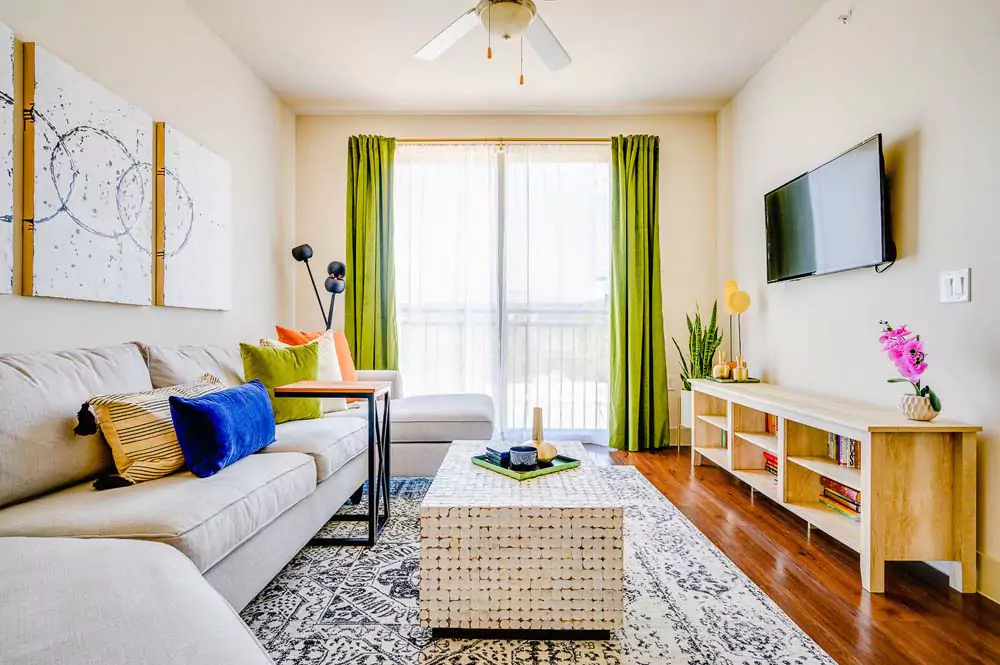
Strategic use of bright colors also enhances natural light, amplifying its effect and reducing the need for excessive artificial lighting. Pairing a bright color palette with reflective surfaces, such as glass or metallic finishes, can further enhance the sense of openness. Whether applied through furniture, decor, or an accent wall, these colors help shift focus away from the TV, ensuring the room feels dynamic, balanced, and full of energy.
3. Add a Bookshelf Next to the TV
Placing a bookshelf next to the TV not only maximizes storage but also introduces a stylish and functional element to the living room. It helps balance the visual weight of the television, preventing it from becoming the sole focal point. By incorporating books, decorative objects, and framed photos, the shelf adds warmth and personality, making the space feel curated rather than technology-centered.
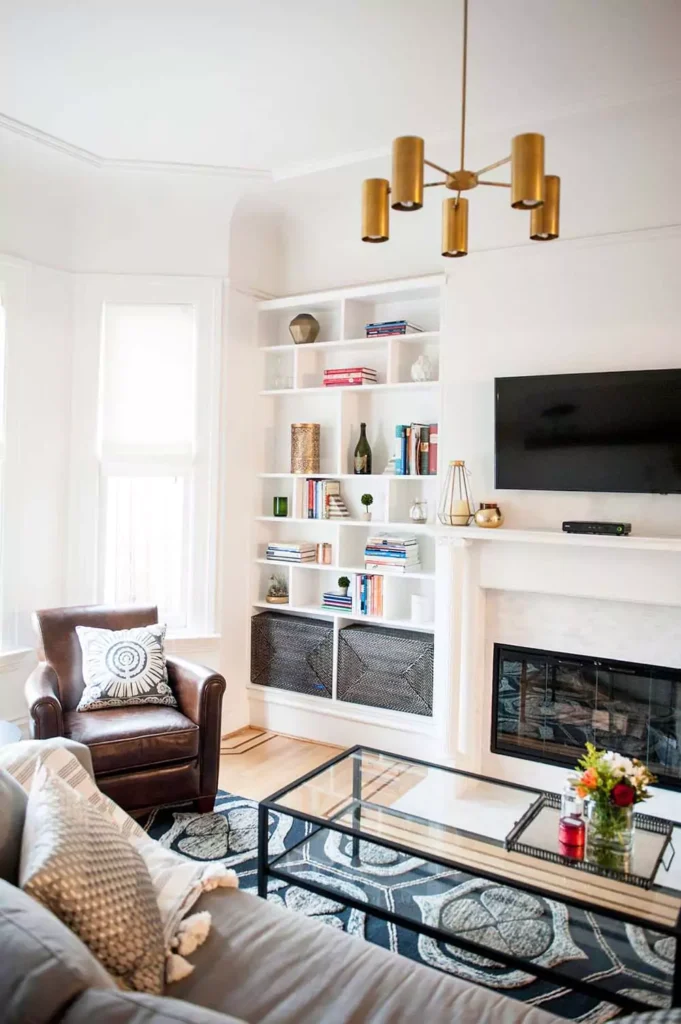
This approach also offers a seamless way to integrate entertainment with leisure, creating a cozy yet sophisticated ambiance. A well-styled bookshelf can serve as a backdrop that softens the starkness of a TV screen while allowing for practical organization. Using a mix of vertical and horizontal arrangements, along with varied textures and colors, ensures that the shelf complements the room’s aesthetic without feeling cluttered or overpowering.
4. Corner It
Positioning the TV in a corner is a smart way to make the most of a small living room while maintaining an open and uncluttered feel. This setup allows for better traffic flow, freeing up valuable wall space for decor or storage. A corner placement can also create a cozy and intimate viewing area, making the television feel integrated rather than overpowering the room’s design.
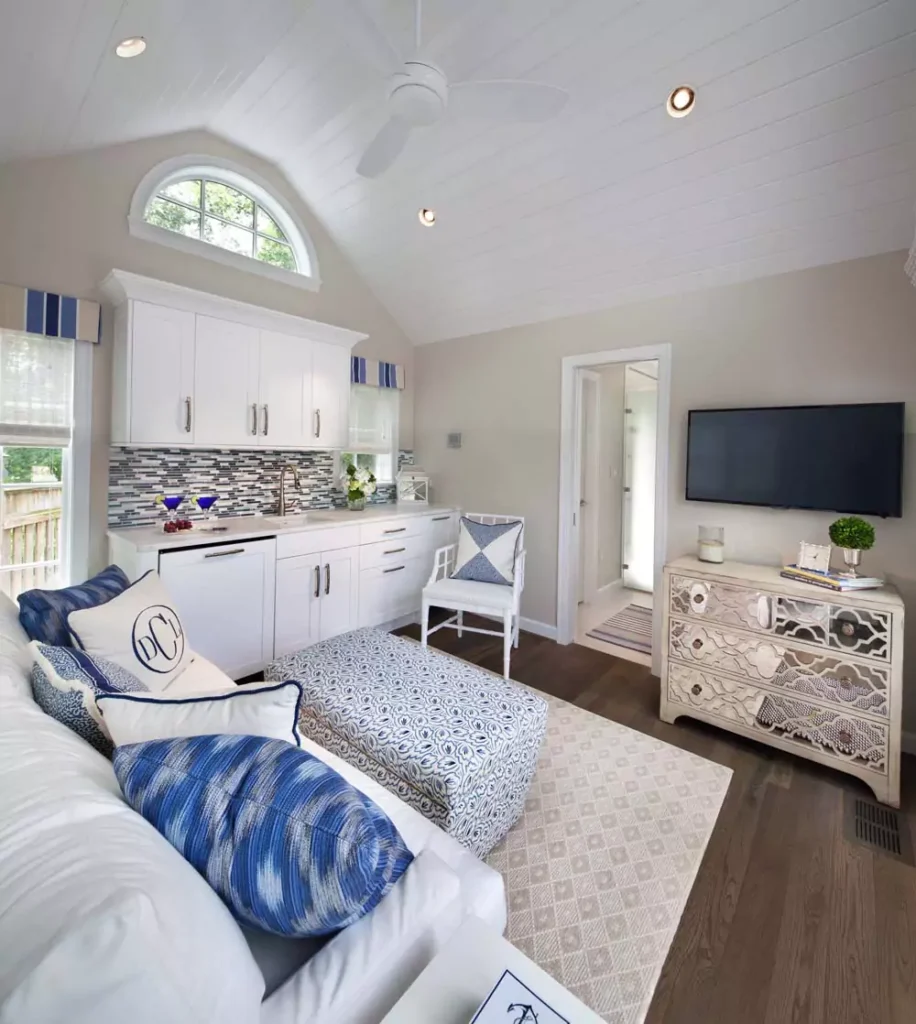
To enhance this arrangement, consider pairing the TV with a sleek corner stand or floating shelves that add both function and style. Soft lighting, such as a floor lamp or wall sconces, can further define the space while preventing harsh screen glare. By thoughtfully curating surrounding elements, the TV blends seamlessly into the room’s aesthetic, making the corner not just a practical placement but also an intentional design feature.
5. Embrace the Symmetry
Symmetry is a fundamental principle in interior design that brings a sense of balance and harmony to a space. Placing the TV at the center of a symmetrical arrangement, such as between two cabinets or above a fireplace flanked by matching shelves, creates a structured and polished look. This setup ensures that the television feels like an intentional part of the decor rather than an isolated element.
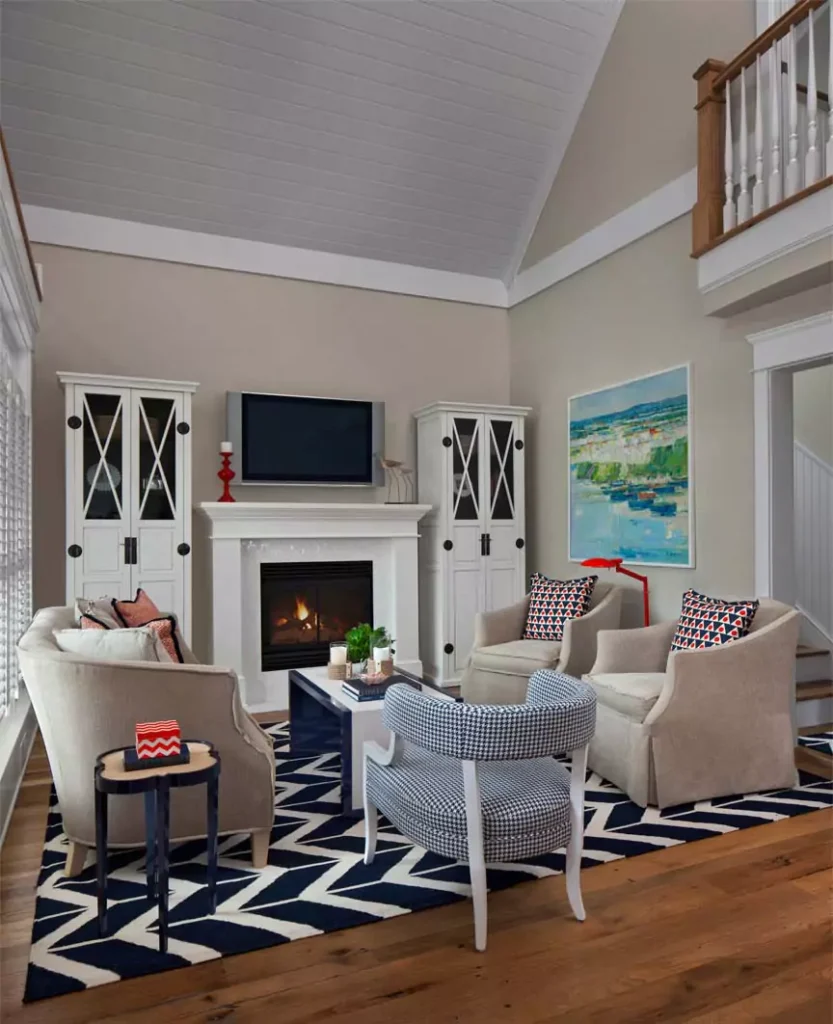
Beyond aesthetics, symmetry enhances functionality by distributing visual weight evenly throughout the room. Arranging furniture in a way that mirrors both sides, such as identical sofas or chairs facing each other, fosters a cohesive and inviting atmosphere. Complementing the TV with symmetrical lighting fixtures or artwork can further refine the design, making the living room feel effortlessly elegant while maintaining a comfortable and practical entertainment space.
6. Place it on the Side
Positioning the TV on the side rather than at the center of the living room creates a more relaxed and versatile layout. This placement works well for those who want the television to be part of the space without making it the dominant feature. It allows for a more natural conversation area, where seating arrangements focus on comfort and interaction rather than being strictly oriented toward the screen.
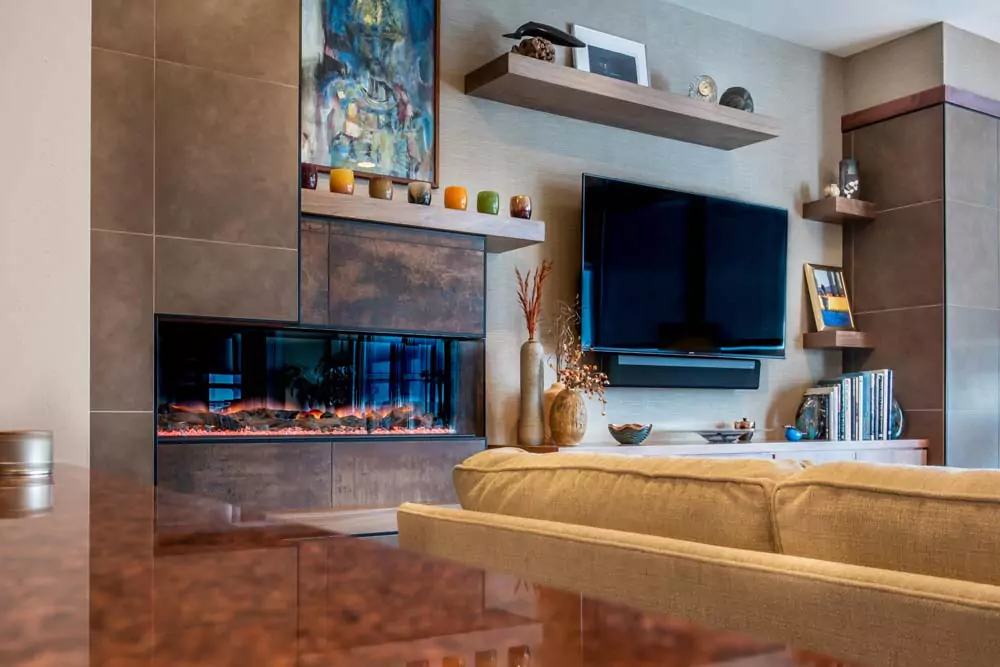
By placing the TV off to the side, the room gains a sense of openness and flexibility. Decorative elements such as artwork, shelving, or statement lighting can take center stage, making the space feel more curated and inviting. This approach also reduces screen glare and provides an opportunity to integrate the TV with other furnishings, ensuring it blends seamlessly into the overall design without disrupting the room’s aesthetic flow.
7. Table For One Please!
Creating a cozy and intimate living space can be as simple as incorporating a single armchair with a small side table. This minimalist setup is perfect for those who prefer a quiet, personal nook for relaxation. Placing the TV within view while maintaining a balanced arrangement allows for a comfortable watching experience without compromising the room’s open and airy feel.
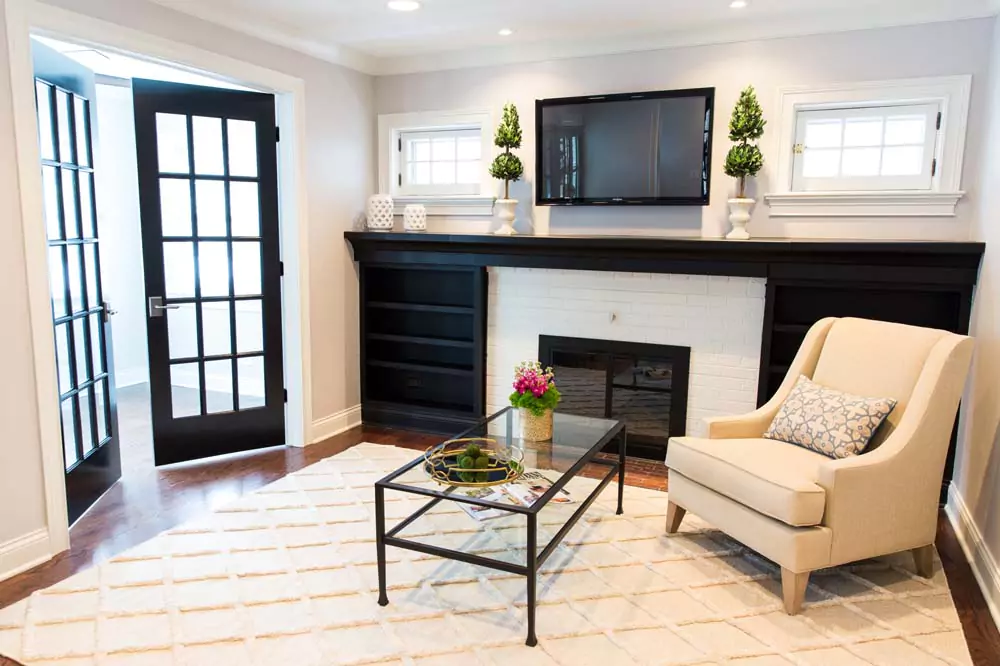
A well-placed side table adds both function and charm, providing a spot for a warm cup of tea, a favorite book, or decorative accents. Choosing a sleek, space-saving design ensures the area remains uncluttered while complementing the overall aesthetic. Whether near a window for natural light or beside a fireplace for added warmth, this arrangement brings a sense of refinement and practicality to a small living room.
8. Try a Traditional Design
A traditional living room design embraces timeless elegance, structured layouts, and classic furnishings to create a warm and inviting space. Placing the TV at the center of the room, surrounded by well-arranged seating, ensures an optimal viewing experience while maintaining a sense of order. Rich wooden furniture, plush sofas, and decorative moldings further enhance the charm, making the room feel sophisticated yet comfortable.
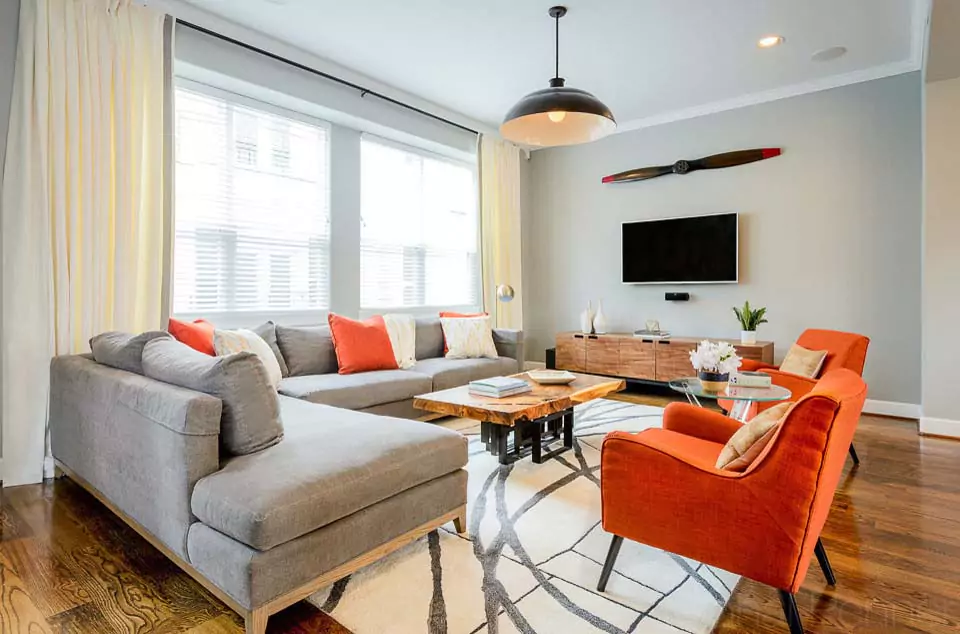
Incorporating elements such as a fireplace, symmetrical bookshelves, or antique-inspired decor can seamlessly blend modern entertainment with classic aesthetics. Soft, neutral color palettes paired with layered textures, like cozy rugs and patterned cushions, add depth and warmth to the space. By following traditional design principles, the TV becomes a natural part of the room rather than a distracting focal point, creating a cohesive and timeless living environment.
9. Behind the Sofa
Placing the TV behind the sofa is an unconventional yet effective way to maintain a multi-functional living space. This layout works particularly well in open-concept homes where the living room flows into other areas, such as a dining space or kitchen. By positioning the TV behind the seating area, distractions are minimized, allowing for a more relaxed and conversation-friendly environment.
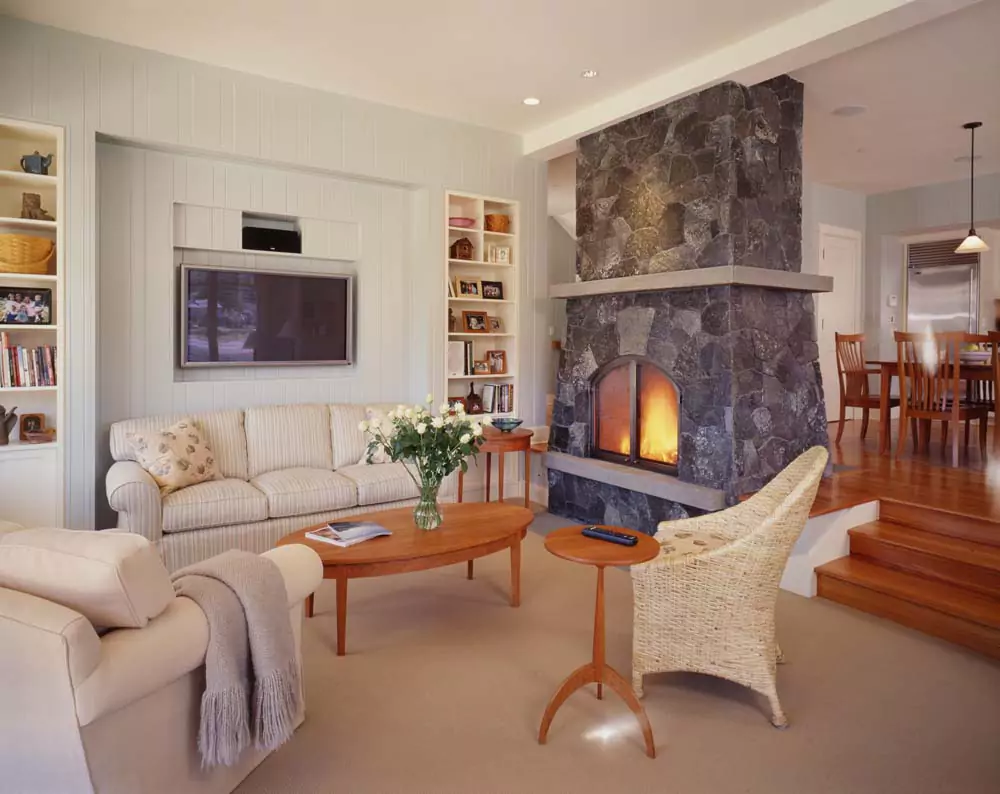
This arrangement also helps balance the room’s aesthetics by preventing the television from becoming the central focus. A stylish console table or a low shelving unit behind the sofa can provide additional storage and a decorative touch, keeping the setup both functional and visually appealing. Thoughtfully chosen lighting, such as floor lamps or sconces, can further define the space, ensuring the TV blends seamlessly into the room’s overall design.
10. Camouflage It
Camouflaging the TV allows it to blend seamlessly into the room’s design rather than standing out as a dominant feature. One effective method is painting the wall behind the TV in a dark shade, such as deep charcoal or black, which helps the screen disappear when not in use. This approach works especially well in modern or minimalist spaces, maintaining a sleek and cohesive aesthetic.
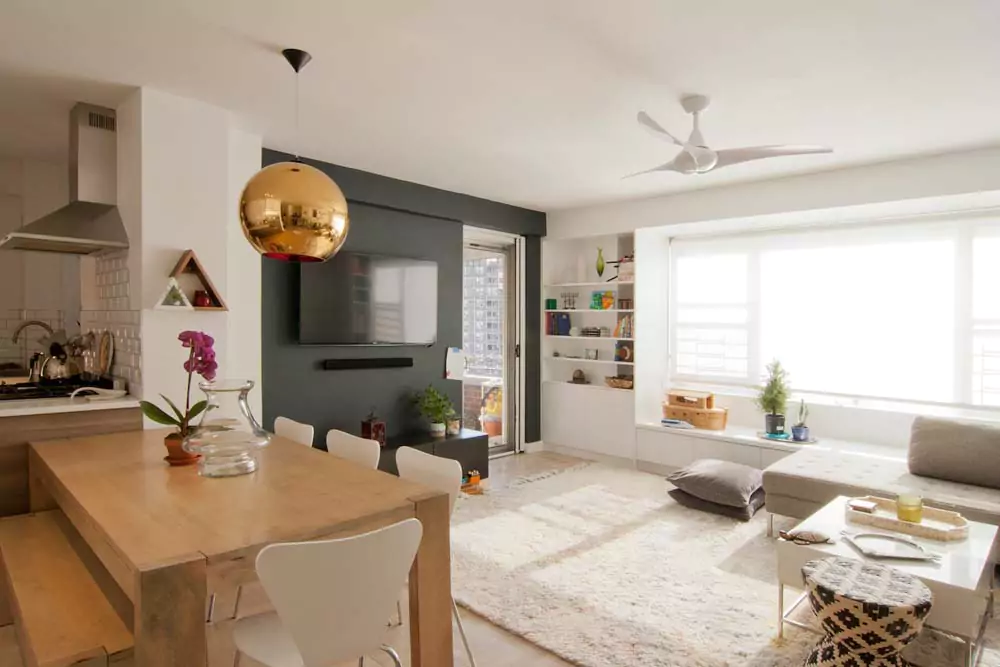
Another way to disguise the TV is by incorporating it into a gallery wall with framed artwork or decorative panels. This technique softens the presence of the screen, making it feel like just another design element rather than the room’s focal point. Using a media console with closed storage or a sliding panel can also conceal the TV when not in use, offering a stylish and clutter-free look while preserving functionality.
11. Use Dark Backgrounds to Conceal the TV
Using dark backgrounds to conceal the TV is a clever design trick that minimizes its visual impact while enhancing the room’s overall aesthetic. A deep-colored wall, such as black, charcoal, or navy, creates a seamless backdrop that allows the screen to blend in effortlessly when turned off. This technique works particularly well in contemporary or moody interiors, adding depth and sophistication without making the TV feel intrusive.
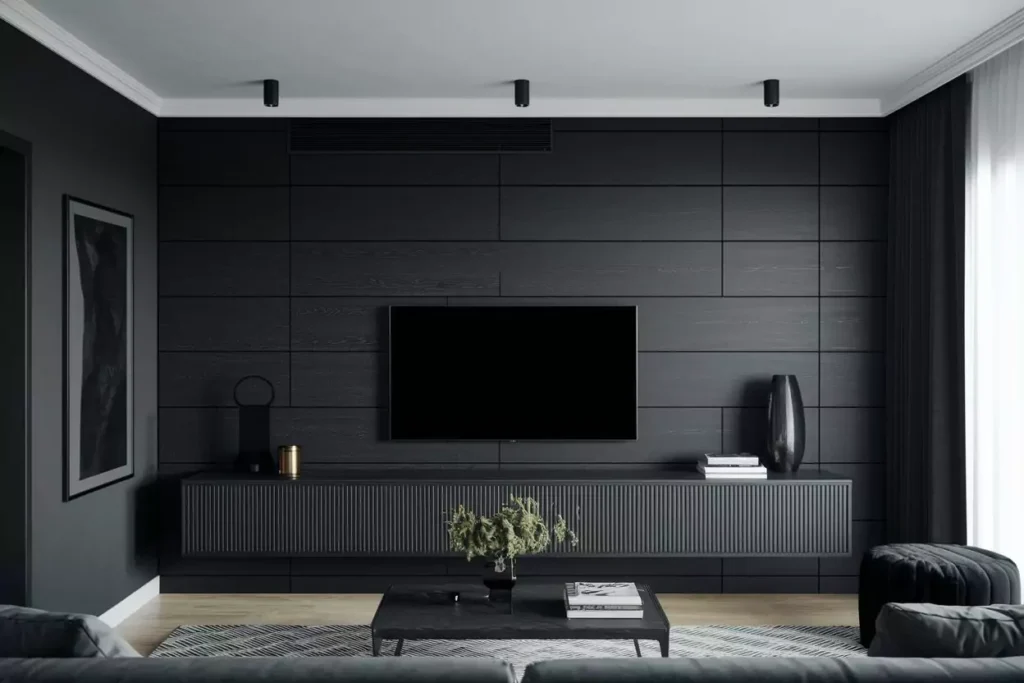
Beyond paint, incorporating textured wall treatments like dark wood panels, matte wallpaper, or sleek stone finishes can further enhance the concealment effect. Surrounding the TV with similarly toned furniture or decor, such as black shelving or dark-framed artwork, reinforces the illusion of a cohesive and intentional design. This approach not only disguises the screen but also contributes to a visually striking and well-balanced living space.
12. Try a Minimalist Approach
A minimalist approach to a small living room with a TV focuses on simplicity, clean lines, and intentional design choices. By reducing visual clutter, the space feels more open and inviting, allowing each element to serve a purpose. Opting for a sleek wall-mounted TV, a low-profile media console, and a neutral color palette creates a calming environment where the screen integrates seamlessly without overwhelming the room.
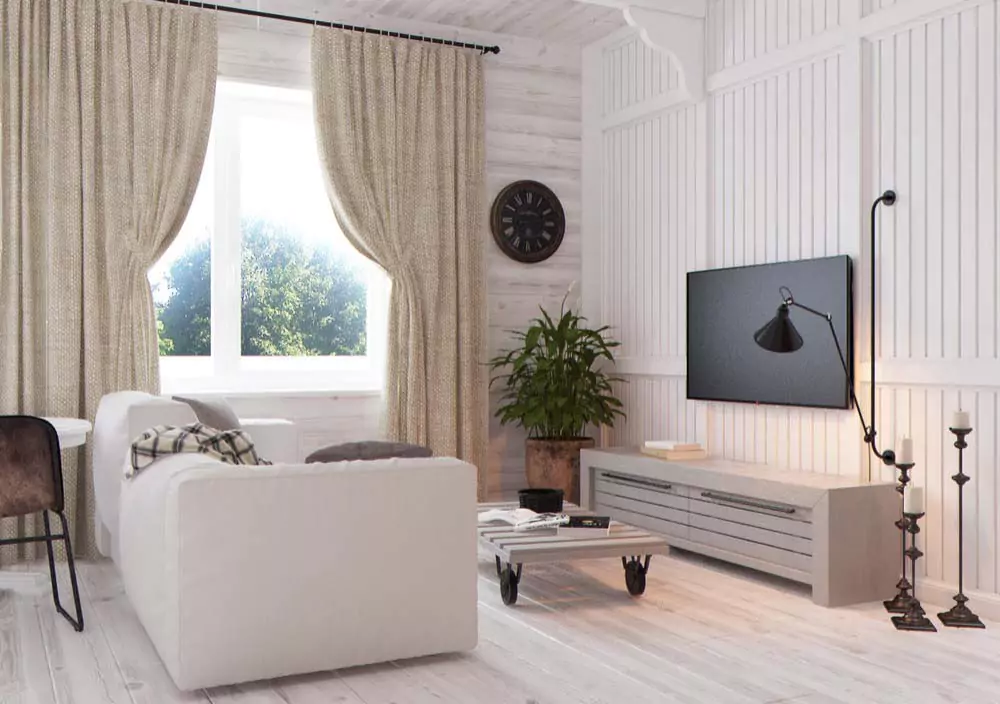
Strategic furniture selection plays a crucial role in maintaining a minimalist aesthetic. Choosing multi-functional pieces, such as a compact coffee table with hidden storage or a streamlined sofa with slender legs, helps maximize space while keeping the layout airy. Thoughtfully placed decor, like a single statement plant or a curated selection of books, adds warmth without disrupting the clean, uncluttered look, ensuring both style and functionality coexist harmoniously.
13. Make it the Center of the Design
Making the TV the center of the design transforms it from a functional necessity into a deliberate focal point. This approach works well in entertainment-driven spaces, where the screen takes precedence without disrupting the overall aesthetic. Framing the TV with built-in cabinetry, stylish floating shelves, or a bold accent wall enhances its presence while maintaining a balanced and cohesive look within the room.
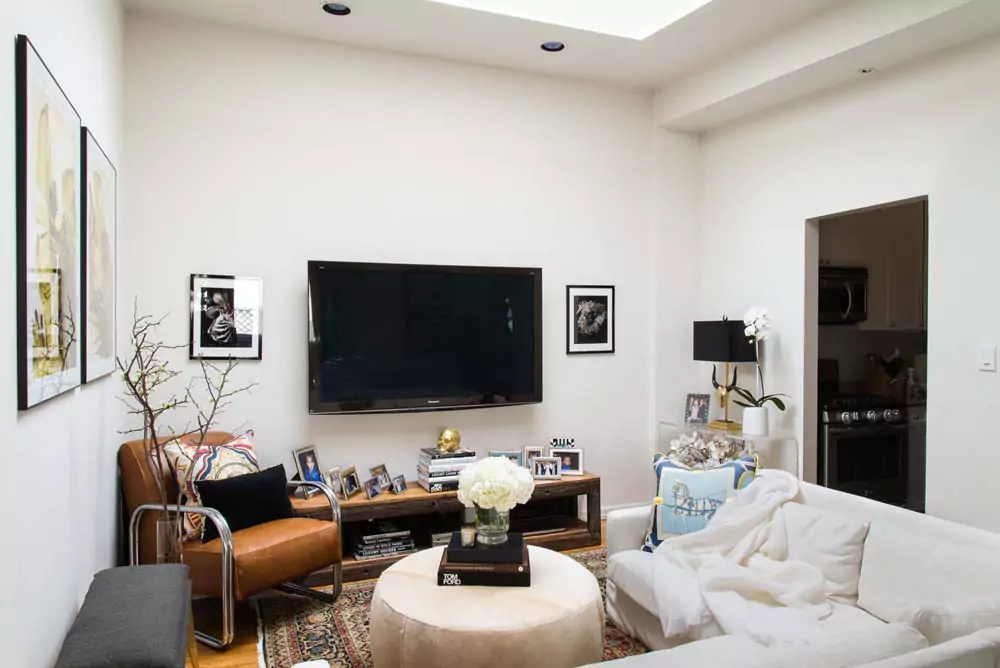
To refine this setup, complement the TV with well-arranged seating that encourages both comfort and an optimal viewing experience. Layering textures, such as a statement rug or plush cushions, softens the focus on the screen while adding warmth to the space. Thoughtful lighting, like wall sconces or LED backlighting, can further elevate the design, ensuring that the TV becomes an intentional, stylish centerpiece rather than a distracting element.
14. Try a Rustic Look
A rustic living room embraces warmth, natural textures, and timeless charm, making it an ideal setting for a well-integrated TV. Exposed wooden beams, distressed furniture, and earthy tones create a cozy atmosphere while ensuring the television blends seamlessly into the space. Mounting the TV on a reclaimed wood panel or pairing it with vintage-inspired decor allows it to complement rather than disrupt the rustic aesthetic.
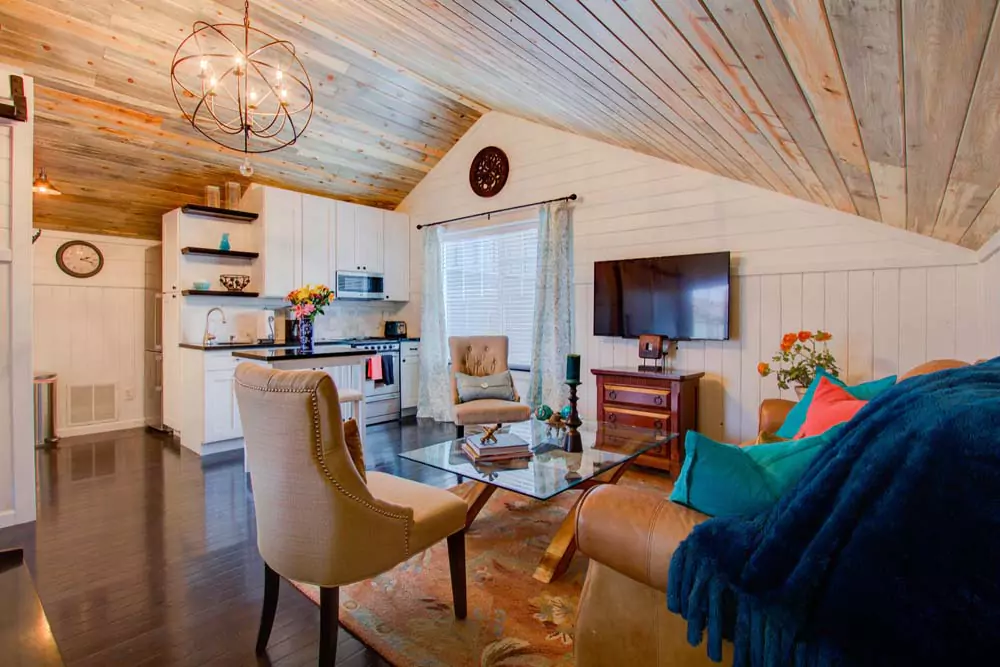
Layering soft elements like woven blankets, plush rugs, and linen curtains adds depth and contrast to the room’s rugged textures. Incorporating antique accents, such as wrought iron light fixtures or handcrafted pottery, further enhances the rustic appeal while maintaining a harmonious balance with modern technology. By thoughtfully blending these elements, the TV becomes a natural part of the design, preserving the warmth and character of the space.
15. Over the Fireplace
Mounting the TV over the fireplace creates a natural focal point, merging two essential elements of a living room—warmth and entertainment. This arrangement maximizes space efficiency, especially in small rooms where wall space is limited. A well-proportioned TV above a sleek mantel or a rustic wooden beam ensures a seamless blend, allowing the screen to enhance rather than disrupt the room’s aesthetic.
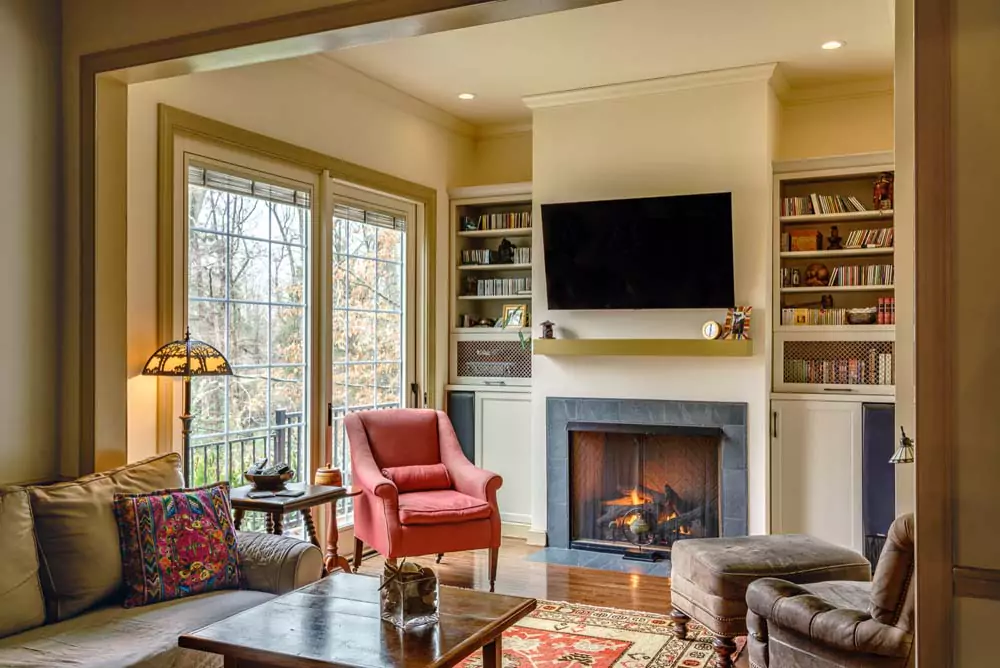
To optimize both function and comfort, consider the height and viewing angle to prevent neck strain. A tilting or adjustable mount can improve visibility, while strategic decor, such as a statement mirror or framed artwork, helps soften the transition between the TV and fireplace. Thoughtful lighting choices, like wall sconces or recessed lights, further refine the space, ensuring the setup feels inviting, balanced, and effortlessly stylish.
16. Incorporate Smart Storage Solutions
Smart storage solutions are essential for maintaining a clutter-free and functional small living room, especially when incorporating a TV. Built-in shelving, floating cabinets, or multifunctional furniture like ottomans with hidden compartments provide discreet yet accessible storage. These elements not only keep media accessories organized but also create a visually streamlined space, allowing the TV to blend naturally into the room’s overall design.
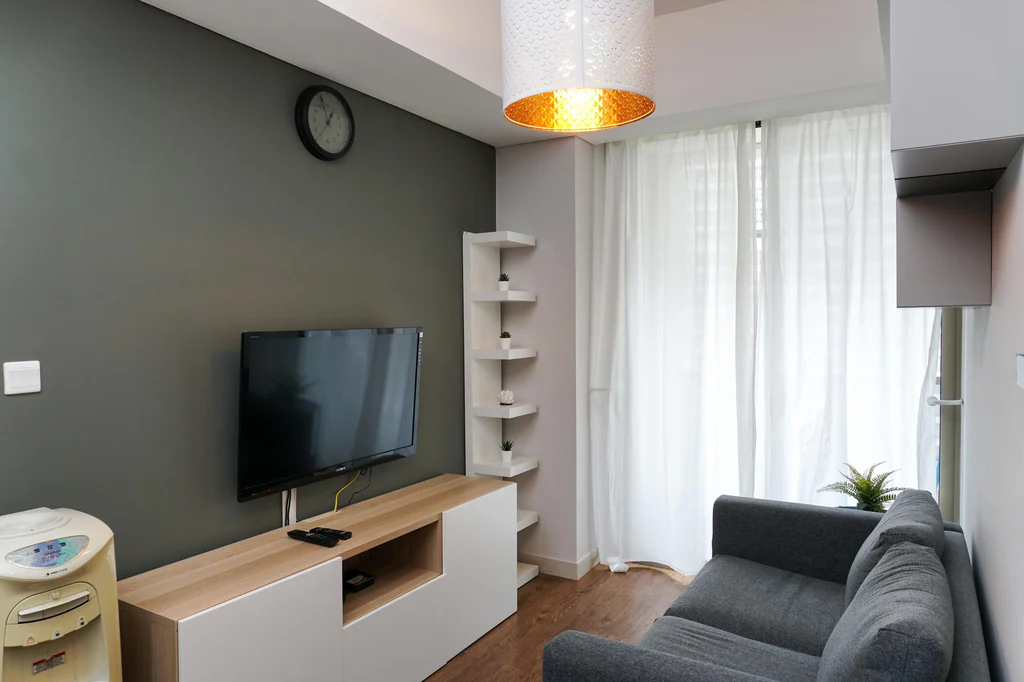
Maximizing vertical space with wall-mounted units or tall bookshelves can further enhance efficiency without overwhelming the area. Custom cabinetry with sliding doors or pull-out drawers offers a seamless way to store essentials while maintaining a clean, modern aesthetic. By thoughtfully integrating smart storage solutions, the living room remains both stylish and practical, ensuring that entertainment and organization coexist harmoniously in a limited space.
17. Use a Floating TV Stand or Wall Mount
A floating TV stand or wall-mounted setup is an excellent way to create a clean, modern look while maximizing floor space. By elevating the TV, the room instantly feels more open, making it an ideal solution for small living areas. A sleek floating console provides storage without the bulk of traditional furniture, offering a stylish yet practical way to keep cables, remotes, and entertainment essentials neatly tucked away.
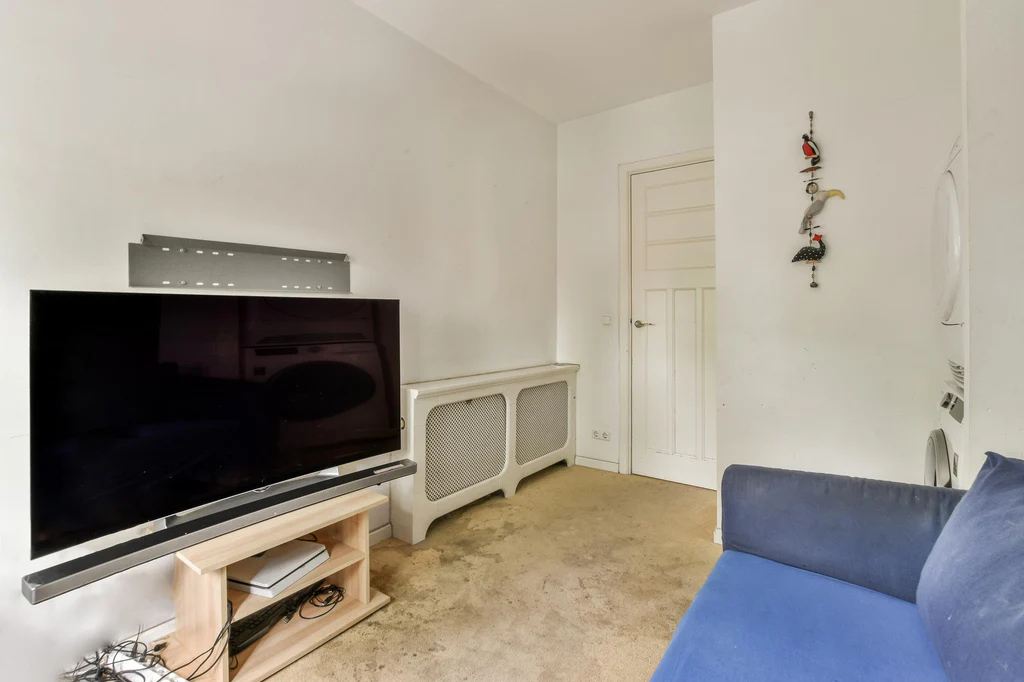
Wall mounting the TV also allows for greater flexibility in furniture arrangement, ensuring the screen is positioned at an optimal viewing height. Pairing it with subtle LED backlighting or a minimalist frame can enhance its integration into the room’s design. Whether opting for a streamlined shelf beneath the TV or a full-length floating unit, this approach maintains an uncluttered aesthetic while elevating both form and function in the living space.
18. Light It Right to Enhance Space
Proper lighting plays a crucial role in making a small living room feel more open and inviting, especially when incorporating a TV. Layering different light sources, such as wall sconces, recessed lights, or floor lamps, helps prevent harsh glare while creating a warm and balanced ambiance. Soft, indirect lighting enhances the overall atmosphere, making the space feel larger and more comfortable for both relaxation and entertainment.
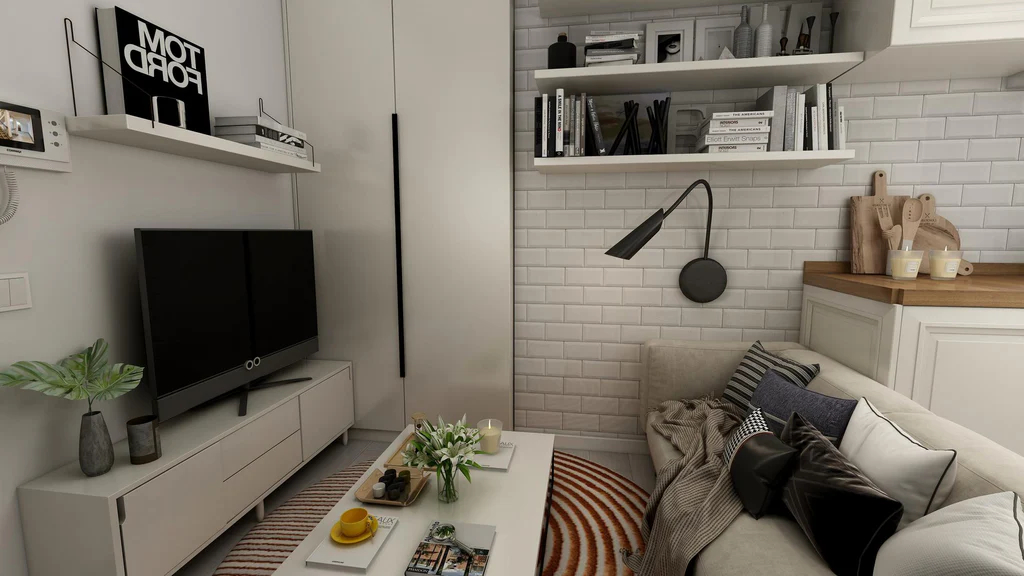
Strategic placement of light can also draw attention to key design elements while subtly integrating the TV into the room’s aesthetic. Dimmable LED strips behind the television create a modern backlit effect, reducing eye strain and adding depth to the space. Pairing natural light with reflective surfaces like mirrors or metallic accents further amplifies brightness, ensuring the living room remains airy, cohesive, and visually appealing.
19. Try a Frame TV for an Aesthetic Look
A Frame TV offers the perfect balance between functionality and aesthetics, seamlessly blending into the room when not in use. Unlike traditional televisions that can feel intrusive, a Frame TV displays artwork or photography, transforming the screen into a stylish decor element. Whether mounted above a fireplace or incorporated into a gallery wall, it enhances the living room’s design while maintaining a modern and sophisticated look.
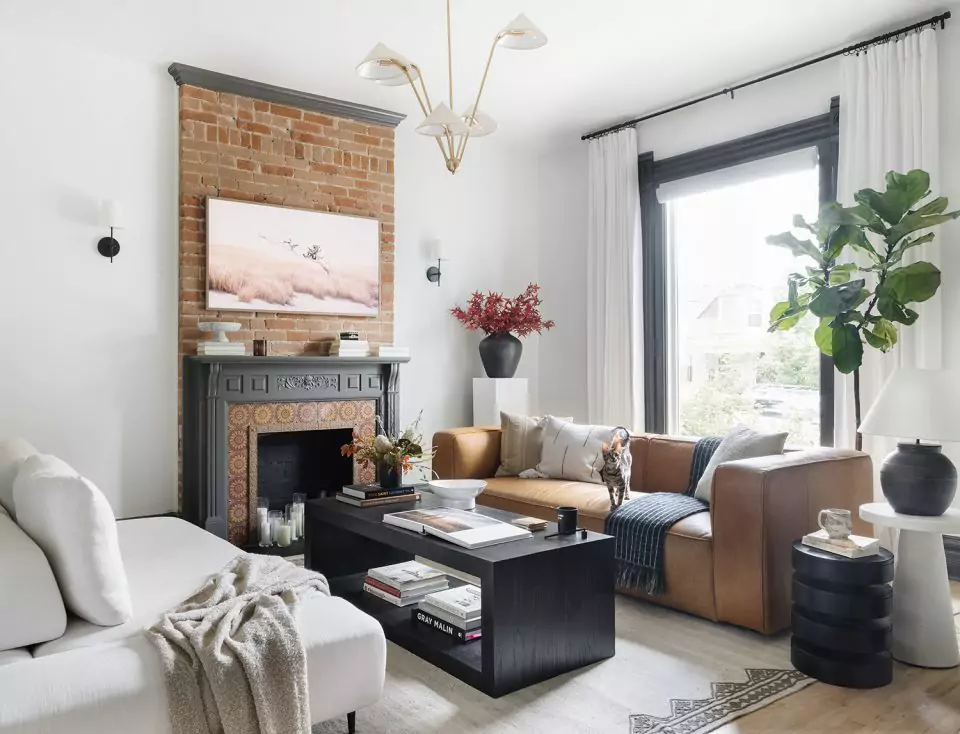
This versatile approach allows homeowners to personalize their space without compromising on entertainment. Customizable bezels, a slim profile, and a variety of art options make the TV feel like a natural extension of the room’s aesthetic. Paired with ambient lighting and complementary decor, the Frame TV creates a harmonious environment where technology and style coexist effortlessly, ensuring that the living room remains both functional and visually appealing.
20. Surround It with Built-ins for a Seamless Look
Surrounding the TV with built-in shelving or cabinetry creates a seamless, custom look that enhances both style and functionality. This approach helps the television blend naturally into the room, preventing it from feeling like a standalone element. By incorporating shelves for books, decorative objects, or storage baskets, the space becomes more visually balanced while maintaining a polished and intentional design.
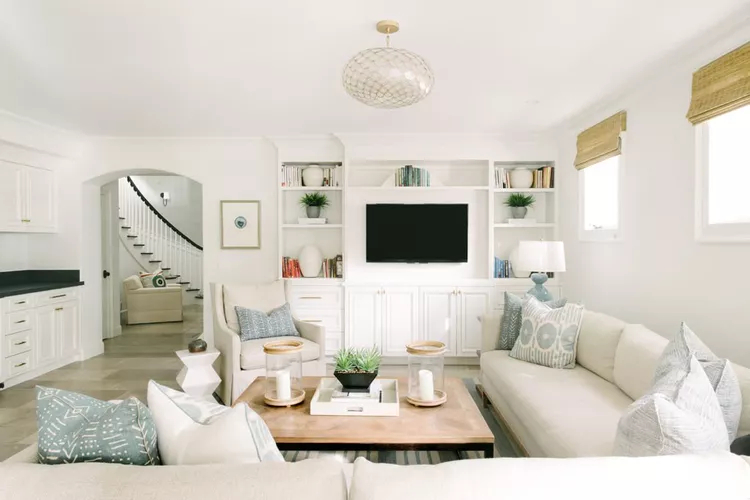
Built-ins also offer a practical solution for keeping clutter at bay, providing designated spaces for media devices, remotes, and accessories. Choosing a cohesive color scheme or materials that match the room’s decor ensures a unified aesthetic. Whether opting for open shelving to display personal touches or closed cabinets for a sleek finish, this design strategy transforms the TV wall into an elegant focal point that complements the entire living space.
Explore these practical and stylish decor tips for small living rooms that maximize your space.
FAQ
How can I make a TV blend seamlessly into my small living room without it overpowering the space?
You can camouflage the TV by using dark backgrounds, incorporating it into a gallery wall, or surrounding it with built-ins. A Frame TV is another great option, as it displays artwork when not in use, making it a stylish part of the decor rather than the main focal point.
What are some space-saving storage solutions for a small living room with a TV?
Smart storage solutions like floating TV stands, built-in shelving, and multifunctional furniture help maximize space while keeping the room organized. Closed cabinets can hide media accessories, while open shelves provide a stylish way to display books and decor, ensuring the living area remains uncluttered and functional.
Conclusion
A well-designed small living room with a TV is more than just a functional space—it’s a reflection of creativity, balance, and purposeful design. By thoughtfully integrating storage, lighting, and layout strategies, homeowners can transform constraints into opportunities, crafting a space that feels both open and inviting. Whether blending the TV seamlessly into the decor or making it a bold centerpiece, every choice shapes the ambiance and usability of the room. The key lies in intentionality—each element should enhance both aesthetics and comfort, ensuring that the living room remains a stylish yet practical retreat.

